In December 2019, I bought my first blue light blocking glasses.
Initially, I was skeptical because I had previously tried apps such as flux and night mode on my iPhone and mac and never got any significant benefits from them.
With that said, I had severe sleep problems and noticed that the more I looked at screens at night, the worse my sleep was.
Since reducing blue light with apps didn’t work for me, I took it to the next level and got blue light blocking glasses from the company RA Optics.
Prior to getting the blue light blocking glasses, I didn’t only have minor issues with falling asleep but a lot of other severe health problems which most likely were exacerbated with years of suboptimal sleep.
By age 26 I had dealt with the following health problems:
- Blood clot in the lungs which nearly killed me and made me lose 1/3 of lung function.
- Going into shock after getting an iodized contrast during a CT scan.
- Multiple emergency room visits and emergency room visits with dangerously high blood pressure and breathing problems.
- IBS-C, ADD, anxiety and depression.
- Low testosterone levels.
I dealt with most of the moderate health problems like low testosterone, IBS and depression by optimizing my training, nutrition and lifestyle as much as I could.
However, sleep was still a weak point and in the long-term, masking years of sub-optimal sleep resulted in bigger problems developing (high blood pressure, blood clot in the lungs).
In this article, I’ll cover how blue light blocking glasses work and why they were one of the most important implements to help me regain my health and unlock new gains in my training.
How Blue Light Blocking Glasses Work
Your body has a natural 24 hour body clock which works as follows:
- In the morning, you have a cortisol (stress hormone) spike which wakes you up.
- 12-14 hours later, your body is releases the sleep hormone, melatonin. This hormone release makes you feel sleep.
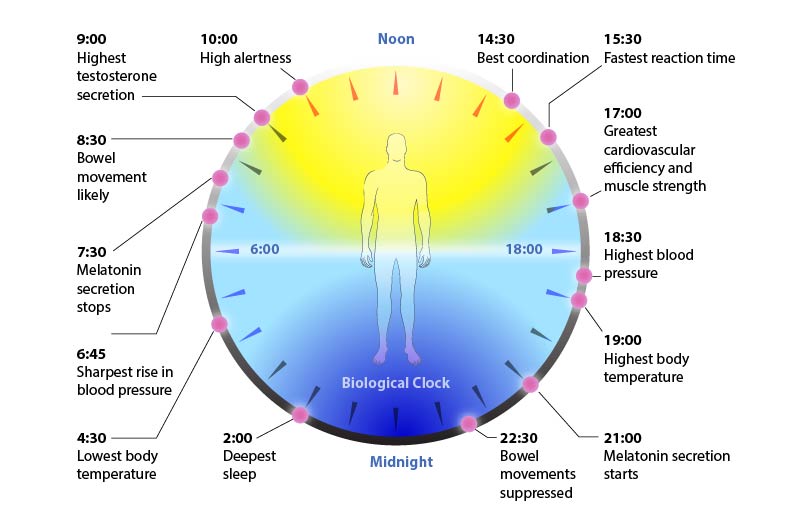
This 24 hour body clock is largely regulated by light. To be specific, if you were to live in nature, you would see sunlight at the beginning of the day with your cortisol spike, then get sunlight throughout the day and then after sundown, you would have no exposure to light.
These light cycles help regulate the cortisol and melatonin releases.
The issue is when you look at the way we live today, this largely goes against the light cycles.
The vast majority of people get close to no sunlight throughout the day due to being indoor and/or using sunglasses when it’s sunny.
Then at night, we spend hours in front of screens that emit blue light and in rooms that are lit with overhead lights.
The combination of insufficient sunlight throughout the day and too much blue light at night leads to the melatonin releases being pushed back.
So essentially, your body starts releasing melatonin later at night, thereby making you feel sleepy much later.
This in turn means that you sleep and wake up late. Or even worse, you either sleep late and wake up early or use sleeping pills/melatonin to force yourself to sleep early then wake up feeling unrefreshed.
In addition, seeing blue light in the late night, inhibits your dopamine release in the day time which in turn leads to problems with attention and motivation (ADD) and mood (depression).
Going against your body’s natural circadian rhythm (and thereby getting suboptimal sleep) can lead to the following short and medium term problems:
- Low testosterone levels.
- Low dopamine levels > Depression / focus problems.
- Lower stress resilience and anxiety.
- Higher blood pressure, LDL cholesterol and blood sugar.
- Higher cravings for junkfood / sugar to get quick energy to make up for the lack of quality sleep.
- Slower recovery between workouts.
- Less muscle gained and less body-fat lost when consistently training and dieting.
In the long-term, the problems get more severe and you have a much higher risk of cardiovascular events and Alzheimer’s.
Studies have shown time and time again that shift workers (who are at the extreme end of this) have far more health problems than an average person.
With blue light blocking glasses, you can help regulate your 24 hour body clock while still being able to use your smartphone, TV etc. at night.
Blue light blocking glasses help block out the blue lights of screens and lights and thereby help facilitate your body to release melatonin in the early evening. Then you can easily fall asleep by 10-10:30 PM and have much deeper sleep.
With deeper sleep and the right light at the right time, you’ll find that pretty much every function of your body improves:
- Higher testosterone levels.
- Higher dopamine.
- Higher stress resilience and less anxiety.
- Lower blood pressure, LDL cholesterol and blood sugar.
- Less cravings for sugar / junkfood.
- Faster recovery between workouts and overall better results from training and dieting.
The question is then: Do blue light blocking glasses produce a better circadian rhythm and deeper sleep when used consistently? I did a 2 year experiment and I’ll share my results below.
My 2 year experience with blue light blocking glasses
In December 2019, I started using blue light blocking glasses everyday.
I had always struggled with waking up a bit too early and being unable to fall asleep.
However, this time around, I started waking up multiple times per night with the first awakening being around 2 AM.
I decided to get the glasses because my insomnia got much worse and I had already spent a year seeing a sleep doctor and neurologist without any results.
The result? Within a few days of implementing the blue light blocking glasses, I found it much easier to fall asleep and stay asleep.
Prior to using the blue light blocking glasses, I had never been able to consistently fall asleep around 10 PM. With my best effort, it was always around 11 PM-midnight. However, on a typical day it would be closer to 00:30-1 AM.
With the glasses, I would naturally start yawning around 9 PM and struggle staying awake past 10 PM. Once I decided to sleep, I would be asleep within 15 min max.
I thought in the beginning that perhaps this effect is placebo. So after a couple of months, I ditched the glasses for a week and tried to sleep without them.
The same issues returned within a few days. I tossed and turned at night and my sleep time got pushed back from around 10 PM to midnight and I woke up frequently throughout the night. Despite being in bed the same amount of hours, I woke up feeling like crap.
With the blue light blocking glasses, my sleep quality improved exponentially.
This in turn led to much higher energy levels, better workouts and better focus.
I had previously been on Ritalin for ADD for over 7 years and the focus and energy I got after finally getting deep sleep was on par with taking Ritalin but much more consistent.
In addition to these, I had massive improvements in cardiovascular health. After having the blood clot in the lungs in late 2018 and losing 1/3 of my lung function I was in and out of hospitals and emergency rooms pretty much every month due to breathing problems and extremely high blood pressure.
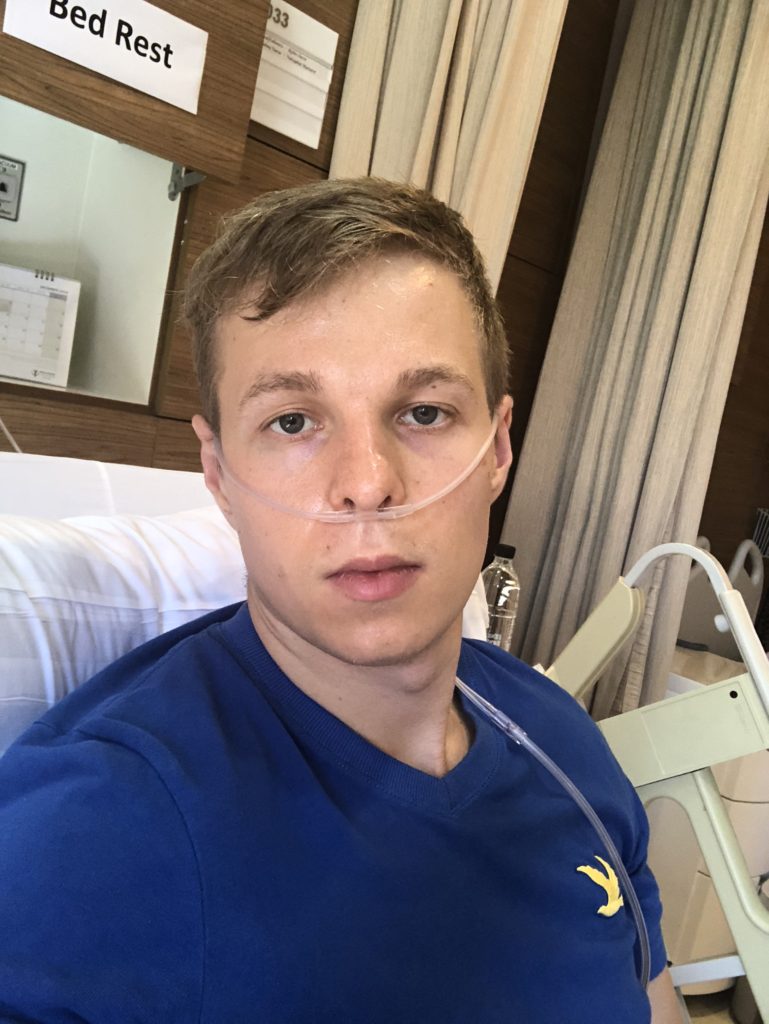
These breathing problems were debilitating to the point where I couldn’t do any intense workouts for over 1 year. It just felt like I couldn’t get enough air when I tried to max out on any exercises or do cardio.
Throughout that year, I saw multiple specialists within cardiology/pulmonology/neurology, tried a variety of blood pressure medications, supplements, herbs and acupuncture but nothing could consistently correct the high blood pressure episodes and breathing problems.
Within a month of consistently using blue light blocking glasses and also spending more time in the sun to further reinforce a good circadian rhythm, these breathing problems and high blood pressure episodes stopped.
As a result, I can safely conclude that for me the blue light blocking glasses were the best health implemented I’ve added. I just wish I started using them earlier.
The brand of blue light blocking glasses that I recommend and use is RA Optics.
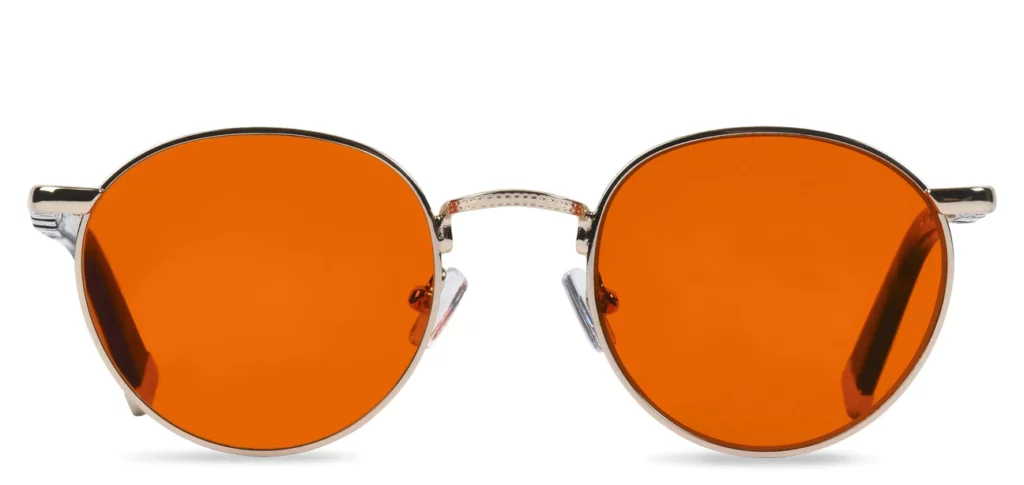
Their glasses and lens have a high build quality. After +2 years of daily use, they still look brand new.
When selecting your glasses, make sure to select the sleep / night lenses. I have NOT tried their day time lenses yet, therefore I cannot recommend these at this time.
Be proud but stay hungry!
Oskar Faarkrog, ISSA Certified Personal Trainer
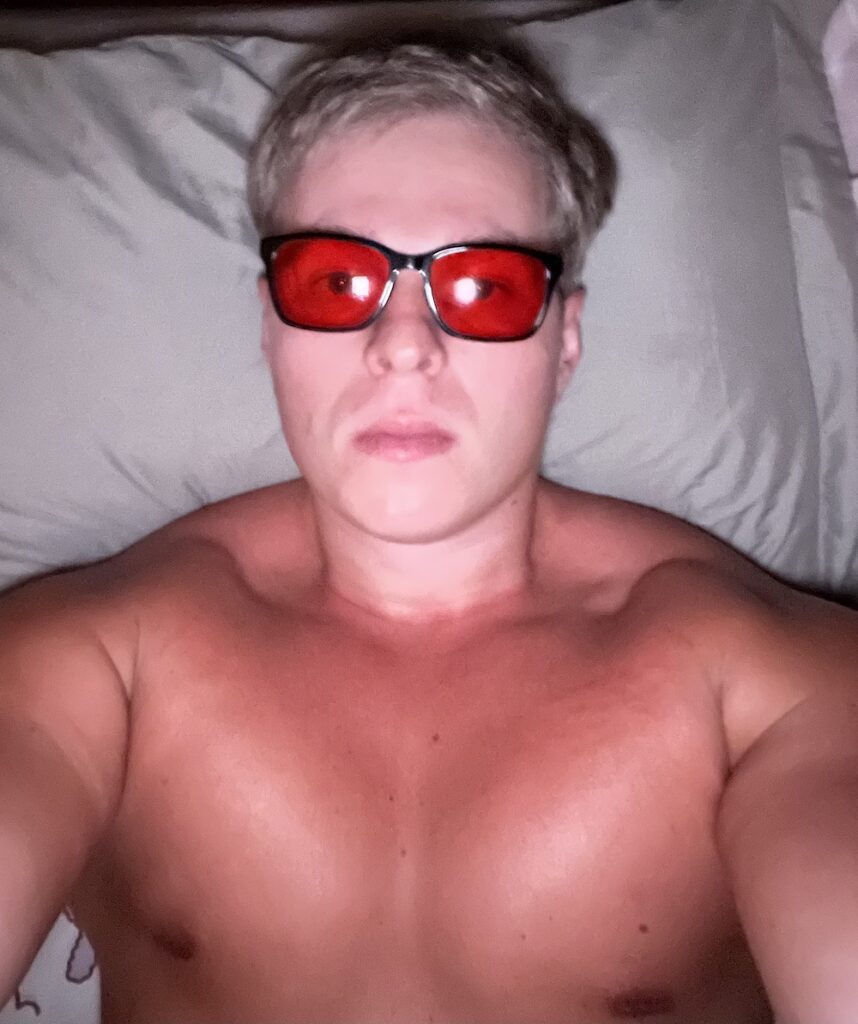
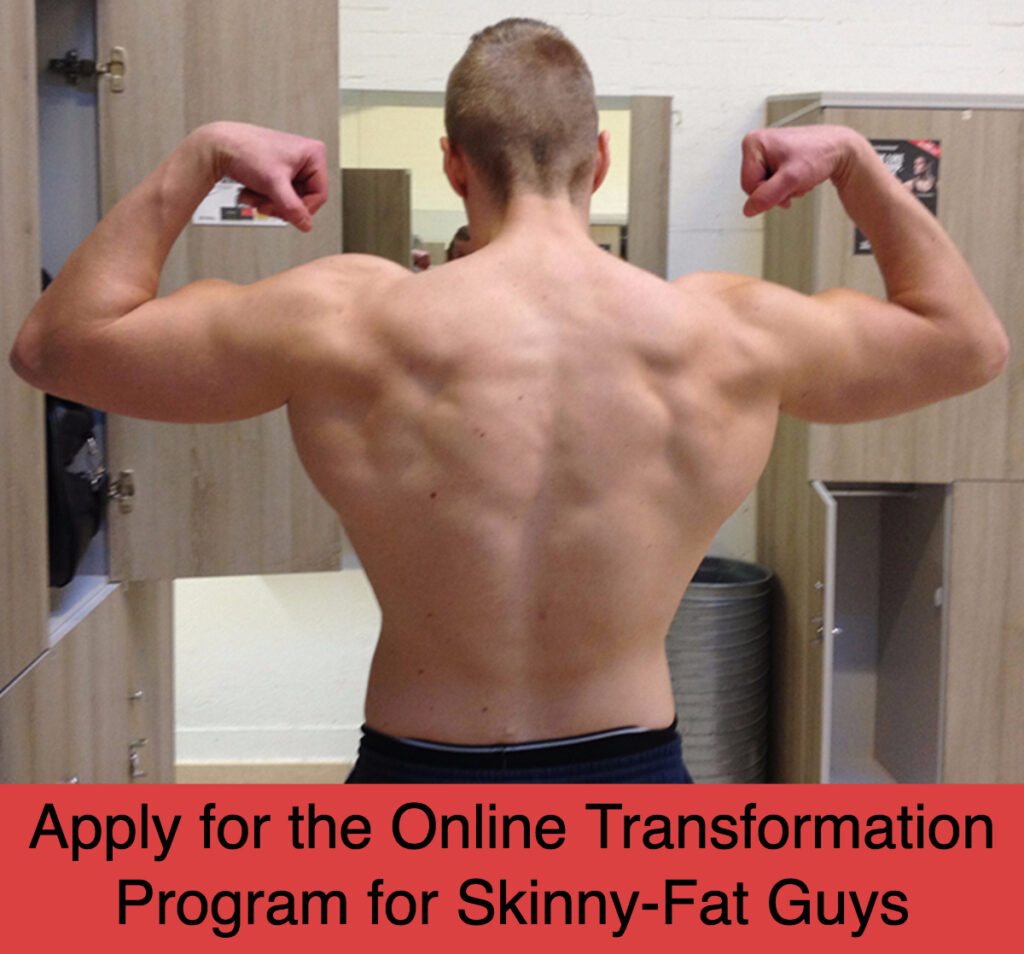
 Skinny-Fat Solution: The 2 Phases of a Skinny-Fat Transformation
Skinny-Fat Solution: The 2 Phases of a Skinny-Fat Transformation
Even i have ADHD Man i can say how difficult it is to study for exams
Hi, nice article, thanks for sharing your experience. Some questions:
1. Do screen protectors on phones that claim to block blue light do as good a job as the glasses?
2. Do you have to wear the glasses all day?
3. I wear regular prescription glasses. Noticed Ra doesn’t have glasses that I can wear over my regular ones. Do you know of any that do?
Thanks!
Hey Ed, I have not personally tried screen protectors, however on iPhones specifically you can remove a lot of the blue light by following the guide here: https://www.youtube.com/watch?v=6ji1hEpotd0
By doing this, you get a much bigger reduction of blue light compared to using night mode and it’s easy to turn on/off with a few clicks. However, to fully remove blue light, you also need glasses. I noticed that when I use both this setting and the glasses, there’s even more blue light removal.
On macs, there’s also an app called Iris which removes a lot of bluelight: https://iristech.co/macbook-blue-light-filter-app/
Keep in mind though, that overhead lights, lamps etc. at home also have blue light. I found that using a combination of blue light glasses + using dim lights at night worked far better than simply using software to remove some of the blue light. You can try using the apps above first and see if you get enough improvement in your sleep then consider the glasses if your sleep still isn’t optimal.
For prescriptions, I just checked and I see that the sleep lenses have an option to add prescription. I personally use regular prescription reading glasses throughout the day when in front of screens and then at night around 8-9 PM I switch to the blue light blocking glasses (without any prescription). There’s no need to use blue light blocking glasses throughout the day.